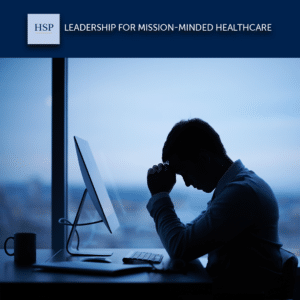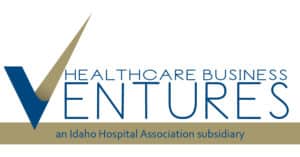By Kurt Mosley, Associations Practice Leader
Burned out. Stressed out. Fed Up.

America’s healthcare system is still recovering from the physical, financial, and mental ravages of COVID. Pre-COVID, the healthcare workforce was stressed out and suffering from chronic burnout. The pandemic assaulted healthcare workers with multiple stressors including overwork, the trauma of feeling helpless in the face of unrelenting patient mortality, fear of the unknown, frustration and resentment from a lack of personal protective equipment and up-to-date personal safety protocols, harassment from patients and their families, abuse of coping mechanisms such as alcohol and prescription drugs, and loneliness.
The country’s healthcare workers have issued a 9-1-1 call for help, for guidance, and for support from their employers. Their mental and physical wellbeing are at risk. They are burned out, stressed out, and fed up.
Executives leading America’s healthcare organizations have not been immune to these mental health challenges. In a recent ACHE Hospital CEO survey, the first and fourth top concerns and priorities are Staffing and Behavioral Health/Addiction. Hospitals have been a primary go-to place of refuge for terrified patients and families dealing with COVID. CEOs and other members of the C-suite continue to be challenged to provide care to their communities in the face of staffing shortages, supply chain disruptions, push-back from the public on suggested or mandated personal safety measures, and a strained infrastructure unable to cope with the high demand for services in aging facilities not designed to accommodate high numbers of patients requiring isolation.
“The selection and support of executive leaders is critical to the burnout crisis of our healthcare workforce,” says Susan Glover, Vice President/Consultant for HSP. “Executive leaders are experiencing burnout and this is substantiated by the turnover seen in healthcare. Leadership is not something that you do to people, it is something you do with people. Much like how parts of the body work together to create movement or performance, leaders create this movement or performance in an organization. Executive leaders are the chief culture officers who can create positive sustainable change and drive excellent performance results when they can first lead themselves and then the organization. Leadership is the energy of the kinetic chain of an organization. Leadership transcends up and down the organization and is responsible for communication and provides connectivity. Executive leadership is the driver of culture and results, including the health of our workforce.”
What has emerged from the pandemic is a clarion call for broader, deeper mental health resources that are readily accessible to the entire healthcare workforce, from the C-suite to the bedside. Organizations searching for new executive leadership are searching for a new kind of leader, one who is empathetic, one who recognizes the need to care for the organization’s employees – body, mind, and spirit. Perhaps most importantly, a leader who understands the importance of taking care of him or herself to be able to adequately lead and care for the workforce.
Studies underscore the need to address mental health issues in America.
Several studies issued recently shine a light on the immediate need to acknowledge and address the growing mental health crisis in America’s workforce.
Mental Health America, the nation’s leading national nonprofit dedicated to the promotion of mental health, well-being, and illness prevention, just published “The State of Mental Health in America.” Some highlights from the study include:
- In 2019-2020, 20.78% of adults – more than 50 million Americans — experienced a mental illness.
- More than half (54.7%) of adults with a mental illness do not receive treatment, totaling over 28 million individuals.
- Almost a third — 28.2% — of all adults with a mental illness reported they were not able to receive the treatment they needed. Of those with AMI, 42% of adults reported they were unable to receive necessary care because they could not afford it.
- 8% — more than 5.5 million — of adults with a mental illness are uninsured. Hispanic adults with AMI were least likely to have health insurance, with 19% reporting they were not covered by insurance.
- 87% of adults who report experiencing 14 or more mentally unhealthy days each month were not able to see a doctor due to costs.
- The vast majority – 93.5% — of adults with a substance use disorder in the past year in the U.S. are not receiving treatment.
- Millions of adults in the U.S. experience serious thoughts of suicide, with the highest rate among multiracial individuals.
- More than 1 in 10 youth in the U.S. are experiencing depression that is severely impairing their ability to function at school or work, at home, with family, or in their social life.
- 8% of youth with major depression do not receive any mental health treatment.
- 34% of youth in the U.S. reported a substance use disorder in the past year. That is equivalent to over 1.5 million youth in the U.S. who meet the criteria for an illicit drug or alcohol use disorder.
- Nationally, 1 in 10 youth who are covered under private insurance do not have coverage for mental or emotional difficulties.
- In the U.S., there are an estimated 350 individuals for every one mental health provider. However, these figures may overestimate the number of active mental health professionals, as it may include providers who are no longer practicing or accepting new patients.
The report’s findings are shocking and disturbing, to say the least, and underscore the tremendous challenges we face in addressing the nation’s mental healthcare needs.
The Robert Wood Johnson Foundation determined the key to addressing these needs is finding a solution to poverty, unemployment, and additional socio-economic challenges, which I will address in a subsequent blog.
The Centers for Disease Control and Prevention published a new Vital Signs report that states:
- More than double the number of health workers reported harassment at work in 2022 than in 2018. This may include threats, bullying, verbal abuse, or other actions from patients, their families, and coworkers, creating a hostile work environment with important implications for health worker mental health.
- Health worker burnout was at crisis levels prior to COVID-19. The pandemic may have further impaired health worker mental health and increased health workers’ intent to leave their jobs.
- From 2018 to 2022, U.S. health workers experienced greater declines on a range of mental health outcomes than other workers,
- To promote worker wellbeing, employers can modify working conditions and change aspects of the organizational structure that are associated with poor mental health. The study suggests such changes could include allowing health workers to participate in decision-making, building trust in management, providing supervisor assistance and enough time to complete work, and preventing and paying attention to harassment reports.
- The CDC launched a federal campaign – “Impact Wellbeing” – to offer hospital leaders a collection of resources to strengthen workplace policies around employee wellbeing and to reduce healthcare worker burnout.
The time is now for healthcare organizations to address the mental health crisis facing its workforce and to marshal resources to support staff needs. HealthSearch Partners is working diligently with clients to identify and place executives with the finger on the pulse of this critical operational issue.
To learn more, contact me at Kurtm@HealthSearchPartners.com, 214.392.3936.
To schedule me to speak to your group on this topic, contact Sarita Gilligan, Sgilligan@HealthSearchPartners.com, 833.477.3932, ext. 718.
Kurt Mosley is the Leader of the Associations Practice for HealthSearch Partners, a national healthcare executive search firm. Mr. Mosley has more than 30 years of healthcare staffing and consulting experience. Cited by U.S. News & World Report, USA Today, Modern Healthcare and many other publications, Mr. Mosley is nationally recognized for his healthcare staffing expertise. He addresses dozens of healthcare professional organizations each year and he is a member of the Executive Speakers Bureau. He has addressed more than 90 healthcare professional organizations such as the State Hospital Association Executive Forum and the keynote presentation to the American Society of Medical Society Executives. In addition to his executive search responsibilities, he will continue speaking on behalf of HealthSearch Partners, sharing industry insights and thought leadership on the pressing issues facing healthcare professionals daily including “The Critical Connection Between Health and Wealth.”




